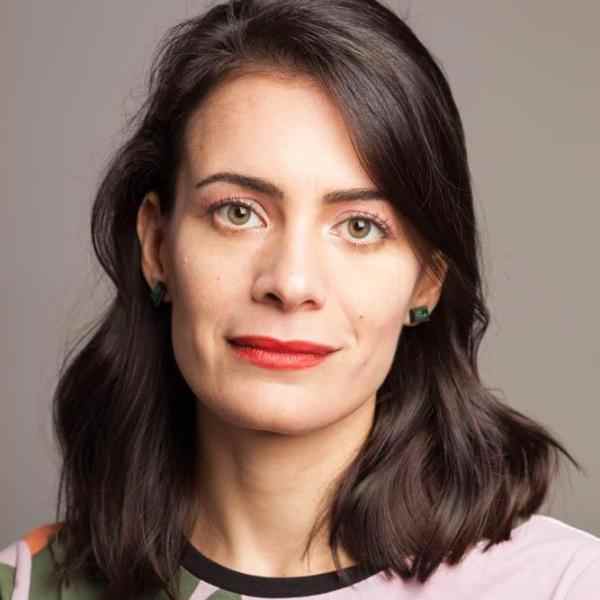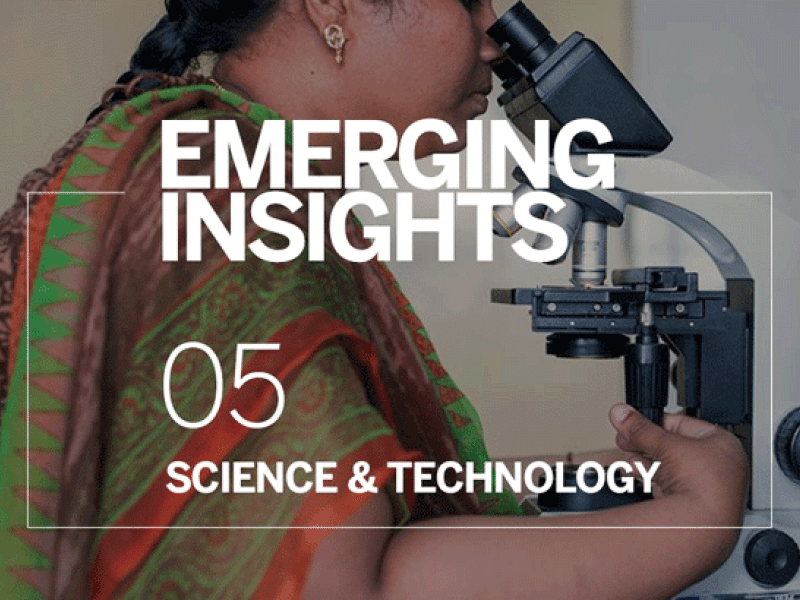Introduction
Melina is developing new roles and dynamics for young women in the field of technology and science. To do so, she puts young women at the center, as creators of solutions and active changemakers in their communities.
L'idée nouvelle
Focused on supporting girls between the ages of 13 and 17, Melina has designed a comprehensive approach to reduce the gender gap in science and technology fields. Through her organization, Chicas en Tecnología (CET), she enables young women to identify real-world problems they care about, investigate them and design solutions through apps along with a range of other technologies. In doing so, she is giving young women the skills they need to be successful in the job market while also enabling them to be changemakers in their communities. With a creative and practical methodology and a strategy that positions schools as promoters and teachers of new technologies, Melina and CET are changing the perception that young girls are not made for science and technology jobs.
To promote full inclusion of young women in the science and technology fields, Melina is targeting a formative age, before girls chose higher education. Therefore, one of the fundamental premises of the organization is that "nobody chooses what they ignore" and consequently believe that the role models/mentors provide a central role to how the organization runs. In order to activate these role models, CET is creating a valuable community composed of professional women from the science and technology world. All of whom have been carrying out their career silently with the purpose of opening the way to new generations and helping them cultivate new vocations.
While many organizations offer technology related experiences to young women, CET seeks to transform the system, focusing specifically on the education system and the vocational development that are on the basis of future job elections. To do so, CET is building a flourishing network of outstanding organizations of schools, universities, tech companies, governments, that work as the supporting ecosystem that girls need in these learning path and career pathways emerge. The network and specially girls are widely nurtured by the unprecedented knowledge CET produces. They proactively create and disseminate original research and knowledge about gender in the technological field and reach all types of audiences, including public officials. This integral approach differentiates Chicas en Tecnología from other initiatives that focus on employment only; CET wants to transform existing spaces to include and elevate women in these fields.
Le problème
The gender gap in the fields of science and technology is continuing to widen. Although the participation of women in higher education has increased, there is still a lack of enrollment in these areas. In Argentina, according to the University Policies Department of the Ministry of Education, only 20% of those studying technology are women and about 11% of women have jobs in the technology sector. Deepening the problem, according to the IDB, 1.2 million programmers will be required in the region by 2025, evidencing an enormous margin for the development in this field.
A technology sector with low gender diversity implies that women participate less in a field characterized by competitive salaries and full employment, but also, and more importantly, the fact that the technological solutions created, may lack a female perspective. A classic example of how this can be a problem can be seen through the virtual assistant Siri, used daily by iPhone users around the world. Created by a group of men, it was programmed to respond to any type of emergency yet remains without answer to the question: "I was raped, what should I do?", even though rape is something that millions of women face around the world. Like this one, there are innumerable problems that are not addressed today by technologies, or if they are, there is usually a gender bias.
In Argentina there is still no detailed information on the institutional and sociocultural barriers that girls, adolescents and women face in the field of science and technology. For example, statistics on the participation of women in the technology industry do not exist to date. It is also necessary to make visible the economic barriers that prevent women from having a greater participation in science and technology, such as care tasks that young girls develop especially those that come from economically poorer sectors. For example, according to a recent study by CIPPEC, more than 700,000 Argentine adolescents and young girls, who do not study or work, are taking care of their children, siblings or seniors, so they do not have available time for studying or recreation. According to the UNESCO Institute for Statistics, women only account for 30% of the workforce worldwide in the field of research and experimental development (R & D). Women represent 35% of the graduates and 21% of the people in decision-making positions. According to the annual report of the World Economic Forum on equality between men and women, Argentina fell from 33 to 34 among 144 nations. The biggest gap is that of income, given that they earned 30% less than men for equal work.
As reflected in the study "Cracking the code" developed by Unesco in 2017, one of the factors that impacts the decision of young women to study technological careers is their direct experience in programs and projects related to Science and Technology, both at school and outside of school. However, the educational offer in this area is accessible mainly to middle- and upper-class sectors. Other studies in the field of education indicate that the experiences that girls have during their childhood and adolescence are key to informing their decisions on what to study in the future. Currently, most girls are not exposed to role models of successful women in technology, nor are there educational policies that promote programs with scientific and technological content, making it difficult for girls to hone their skills at an early stage. . This absence of women in the field prevents the access of many young women to a path of vocational development linked to this field.
La stratégie
Chicas en Tecnología is a young organization that has positioned itself as an expert in the field of women in technology. Within three years it has established programs in more than 100 formal and non-formal educational institutions in 13 provinces of the country.
In 2015, Melina and eight young women responded to an open call from "Girls in Tech ", a US organization, to develop a chapter in Argentina. She soon realized that the context of Argentina and the challenges in the area required a different approach and she launched a totally independent organization in Argentina: Chicas en Tecnología (CET). The CET approach puts young women at the center, enabling them to create technological solutions to the problems that most concern them in their community.
During this process, they become familiar with technology creation, but also incorporate social emotional tools and skills that go beyond the devices. All of its initiatives are aimed at a diverse young women's audience in terms of socio-economic background and geographic location, considering that the gender gap in the technological entrepreneurial sector affects all levels. Each program or activity begins with an assessment of the devices and technology available in each group and the mapping of local organizations that can be linked to the project: schools, IT companies, clubs, etc.
Melina´s strategy rests on three pillars. The first pillar focuses on enabling Girls to transition from passive consumers to producers of technology for the common good through three programs. First, Programming a Better World (PUMM), an intensive technology program for girls from 13 to 17 years old. Over three days, the participants design and develop a mobile app that solves a problem in their community in a creative and applicable way. During the program, the young women research a specific problem in their community that specially concerns them, they learn and then create a application-based solution. For example, Sin Tabú is a tool that attacks the lack of information on comprehensive sexual education in a didactic and effective way, and the app UnaManoParaTodos helps indigent and homeless people, by mapping and connecting them with private NGOs and community sites, so that they can be easily found and assisted.
Program participation is collective, so that young women, among learned technological skills, gain other skills such as teamwork, argumentative debate, logical reasoning and communication skills in order to present and disseminate their developed solutions. To date, PUMM has 270 graduates and continue to make new editions thanks to leading companies in the technology sector such as MercadoLibre, Medallia, Area Three, IBM, among others.
To reach other provinces, Melina and her team created the second program called “Chicas en Tecnología Clubs”: a similar approach that is implemented in educational institutions throughout the country led by their own educators and with the support of CET. The curricula for the Clubs CET consist of 14 weekly meetings in which participants identify problems, devise and implement technological solutions developed in group. Educators receive specific training and assessment that allows them to navigate the technological world with confidence and develop new skills.
As with PUMM, in the CET Clubs, young girls learn all kinds of skills and fundamentally change their way of interpreting problems in their environment; proposing viable solutions created by them. CET Clubs started in 2017 and have included 80 young women, 12 educators, 7 schools, and have generated 30 prototypes of social impact apps. In 2018, they actively developed partnerships with 12 local education ministries and companies along the country to create 50 new Clubs and directly impact more than 1,000 girls. Some of the applications developed addresses Bullying, in which a child can report incidences of bullying without outing him or herself to the public thus changing the school protocol in this matter after the previous research of the problem in which the girls discovered that many cases of bullying were not reported before in order to avoid exposure and shame. One the favorite topics that young women choose is sexual and reproductive health, still a controversial topic in Argentina. Applications can help significantly deepening girls’ knowledge of the subject and fulfill a preventive role. In some of the Clubs, young girls are co leading the program with the responsible teacher shifting the way in which teachers engage young students around the topic.
The third program is “Girls in Technology Community” (Comunidad CET) which is a platform for CET alumni, where Melina and team follow and support the young women and their projects, bringing additional scholarships and opportunities to follow up encouraging non-formal training trajectories. Melina and her team specially cultivate a close and co-creation relationship with young women through which they keep updated on their interests, fashions and concerns which later nourishes the contents and communications with girls. As an example, at the beginning of this year, CET invited their alumni to a year´s opening meeting where they discussed and co-created the opportunities and interests for the area in 2018.
During 2017, CET worked on the report “Voices of the protagonists”, a digital document, portraying the opinions and responses of 75 girls who participated in three previous editions of PUMM and which has become a guide to understand the concerns and problems posed by young women regarding their link with technology. To make the report, CET convened a team of specialists: researchers, educators and project design specialists. Beyond the report, the EduTeam will focus on scaling, research and innovation, with projects such as the CET Clubs, the production of own data and impact reporting among others. This is a transversal team that shares a dynamic of collaborative and creative leadership.
The second pillar is focused on Knowledge building. For this purpose, CET created the R + D + I area, a cross-sectional area of the organization that aims to produce and communicate data that supports advocacy work around the real inclusion of women in the field of science and technology. The first important product is a quantitative survey of women programmers in Argentina, producing an open and public database on women in careers related to programming in the country. They surveyed 80 universities and the results were presented at a public event attended by more than 200 players of the technological and educational ecosystem, and more than 4,000 people from across the country joined via streaming positioning as trending topic with #programming women on Twitter.
The mentioned study has been especially relevant in the field and caught the attention of media and relevant organizations. The Minister of Science, Technology and Productive Innovation, attended the event leading a panel of specialists who highlighted the relevance of the study. As a result, key organizations such as the Undersecretariat of Strategic Management and Institutional Quality of the City Government in Buenos Aires, different Universities and CONICET (National Council of Scientific and Technical Research) contacted CET to inform them that they started using the data developed in the research and opened working conversations. At present, they started a collaboration with IDB INTAL to develop a new research and a technical note disseminating previous and new findings.
Melina plans to continue developing own data in the field and will start tracking the incidence of their programs in vocational preferences for the first's cohort of secondary school graduates at the end of current year. Knowledge development and strategic partnerships nourishes the third institutional pillar: public awareness and advocacy. In this concern, in March of 2018, they launched a campaign and microsite "Mujeres Argentinas en STEAM" in order to connect Argentine professional women in these fields to inspire and connect them with the new generations of girl entrepreneurs. The campaign raised exposure to the profile of 18 women technologists and scientists, who explained in a very simple way the work they do in these fields. The site includes audio messages with advice from these women for their successors. Melina has also been invited as a permanent columnist of Diario La Nación writing about innovation, education and technology.
Both the direct-action programs for the young women, as well as the research and advocacy campaigns are developed with a wide network of allies and mentors composed of 42 Club referents and 100 volunteer mentors from technology companies and related organizations. Among the most important institutions are: CONICET, Ministry of Education and leading technology companies such as Google, MercadoLibre, IBM, MuleSoft, Digital House, Acámica, Equals Global Partnership, among others. For Melina and her team, the coherence between the values of her organization and the allies is key and even when the development of funds is a challenge, they decided to end alliances with companies in the sector when they discovered that some business practices were contrary to the mission of CET.
Qualitative studies carried out to the participants indicate a positive change in terms of their positioning towards technologies. For example: there is an observable transition from consumers to technology creators, they experience the power of technology as an amplifier of their voices and their capacity to influence their environment and include technology related careers as a vocational option. Melina and her team believe that young women have to take an increasingly prominent role in the organization. For this reason, they were set up as a civil association, and believe that in the medium-term future girls may have a role in institutional governance. At the moment, young women participate actively in content design for their courses and in building the public: through interviews in the local media and participation in spaces of technological entrepreneurship.
La personne
Melina was born and grew up in Playa Unión, a small town in Patagonia with a diverse population including indigenous groups. Her parents were active members of the community – medical doctor and teacher - who would organize collectively to face difficult climatic conditions and successive natural catastrophes. Melina grew up in an environment where science was part of everyday life. When she was 8 years old, inspired by a book she had received, she proposed to her classmates and teachers to create an ecological cleaning crew to maintain the cleanliness of her town. Every Sunday, Melina and her team, encouraged by their teacher, cleaned the coast and the streets of Playa Union, and alerted the authorities when they found penguins or glued whales, problem quite common caused by the oil industry in the region. She loved science and developed a curious mind.
During her adolescence, Melina cultivated her passion for classical dance. When she was 14, she was selected by the prestigious dance school of the Teatro Colón and made the difficult decision to live 1400 km away from her family. The highly demanding training allowed her to strengthen her talent but also learn key life lessons, such as the importance of collaboration.
After some years in the professional dance world, she decided to stop this path to continue her studies on educational science. She began working on a wide range of programs related to technology and education, including environmental justice, involving young people and tackling the gender gap. In that apprenticeship phase, she led projects in Fundación Leer where he worked with rural communities in the country, the Santillana Publishing house where she focused on teachers training and the Wikimedia Foundation where Melina launched the chapter on education that was subsequently replicated in several countries.
Melina creates, encourages and is part of several communities oriented to transform education and technologies that serve as a platform for the dissemination of her idea and vision such as The Wikipedia Education Collab, Wazzabi and TEDxRio de la Plata Education, among many others. This journey led her to co-found, in 2015, Chicas en Tecnología, where she is also Executive Director. Melina is a leader and opinion-maker in her field: she has published over 25 publications and is currently a columnist for the newspaper La Nación, where she writes about the importance of women in technology.

 Tile image
Tile image

